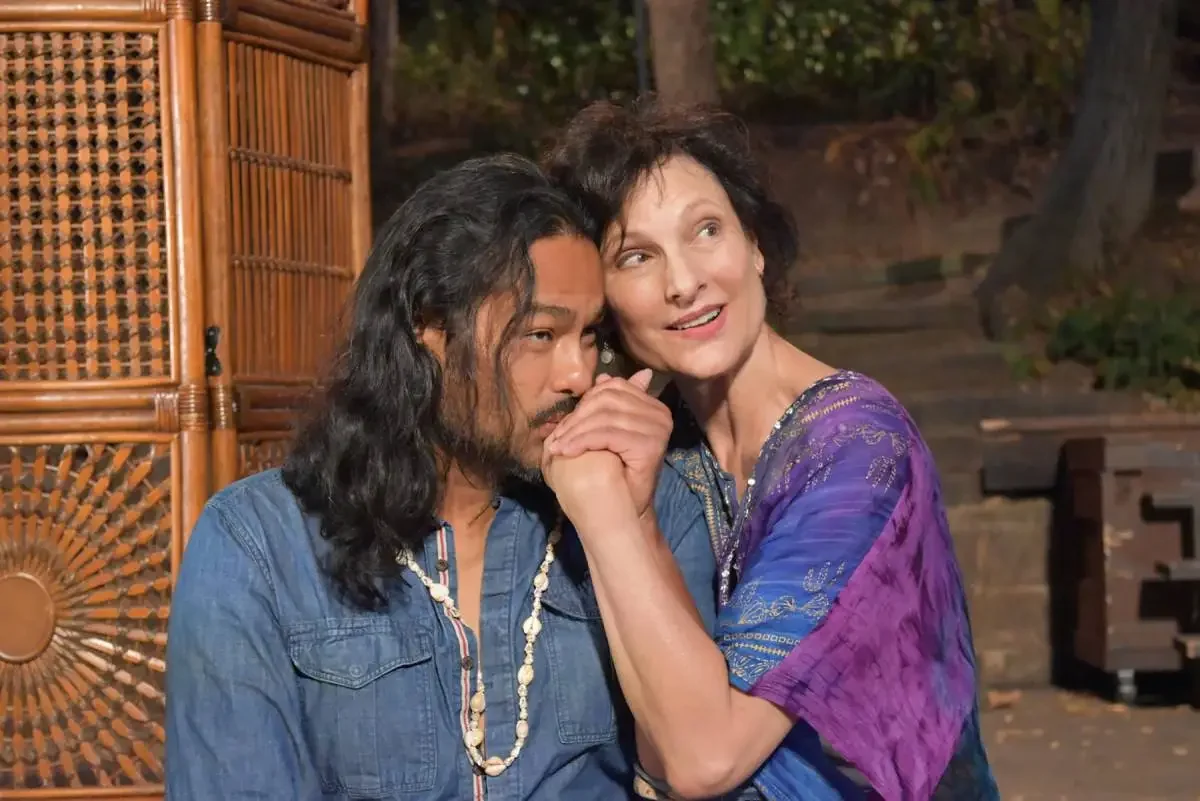Rajiv Shah Soars In ‘The Seagull,’ A Chekhov Classic With A Climate Twist
By Fatima Baldiwala
originally published on India West Journal
photos by Ian Flanders
Brought up on a steady stream of Bollywood blockbusters—where love is loud, family is foundational, and heartbreak is backed by a swelling score—Indian audiences might find Anton Chekhov’s The Seagull deceptively quiet. But beneath its restrained surface lies a story every bit as intense as our most epic sagas. Set against a backdrop of artistic ambition, unspoken love, and generational conflict, The Seagull delivers the same emotional stakes—just without the dance numbers.
In the aftermath of the civil rights movement, a disillusioned young writer is haunted by the rise of a consumer-driven, plasticized world and the early warning signs of climate change. This is The Seagull: Malibu—an evocative retelling of Chekhov’s timeless masterpiece, re-imagined by Theatricum artistic director Ellen Geer. Will Geer Theatricum Botanicum presents the world premiere of this adaptation, with performances running from July 12 to October 5 as part of its repertory season in Santa Monica.
This summer’s production breathes new life into the classic, in no small part thanks to Rajiv Shah, who plays the brooding writer Trigorin, renamed Trigger Hale for this “retelling” set in 1970s Malibu.
Born to Indian parents in the U.S., Shah is an intriguing and unconventional casting choice. A former athlete turned actor, his journey to the stage mirrors the internal wrestling that defines his character—caught between public success and private dissatisfaction.
In Shah’s hands, Trigger is less of a literary cliché and more a man grappling with the weight of expectations, both societal and personal. His performance feels lived-in, grounded by the very real struggle of an artist who wonders if the work is ever enough.
Shah’s background as a writer adds emotional depth to Trigger’s exchanges, particularly when he speaks about the burden of constantly needing to produce, to stay relevant, to be both consumed and consumer. For Indian viewers familiar with the pressure to be both dutiful and exceptional—beta, why not doctor and artist?—this version of Trigorin will feel sharply relevant.
While The Seagull ends in tragedy, it is, ironically, a comedy. Chekhov’s genius lies in his ability to make us laugh at our own absurd hopes. Each character is chasing a dream that slips just out of reach—Nina’s romantic idealism, Konstantin’s tortured need to be taken seriously, Arkadina’s battle with fading fame. These characters could easily walk into a Bollywood script: melodramatic, magnetic, and deeply misunderstood.
What struck a particularly resonant chord was the play-within-a-play written by Konstantin. In this adaptation, his work critiques climate change—an artistic risk mocked by the older generation who insists that art should entertain, not educate. This tension between purpose and popularity, relevance and tradition, mirrors debates in both Indian cinema and literature. What is the role of art? To soothe or to stir? To reflect beauty or confront truth?
Ultimately, The Seagull: Malibu may seem like an unlikely evening for those raised on musical interludes and epic declarations of love. But its restrained chaos, its careful unpacking of the human condition, offers a slow burn that lingers long after the final bow. Chekhov doesn’t give us dramatic confrontations under pouring rain—but he gives us something just as powerful: a mirror to our own hopes, failures, and yearning to be understood.
And thanks to Rajiv Shah’s compelling performance, that mirror feels not only timely, but deeply personal.

